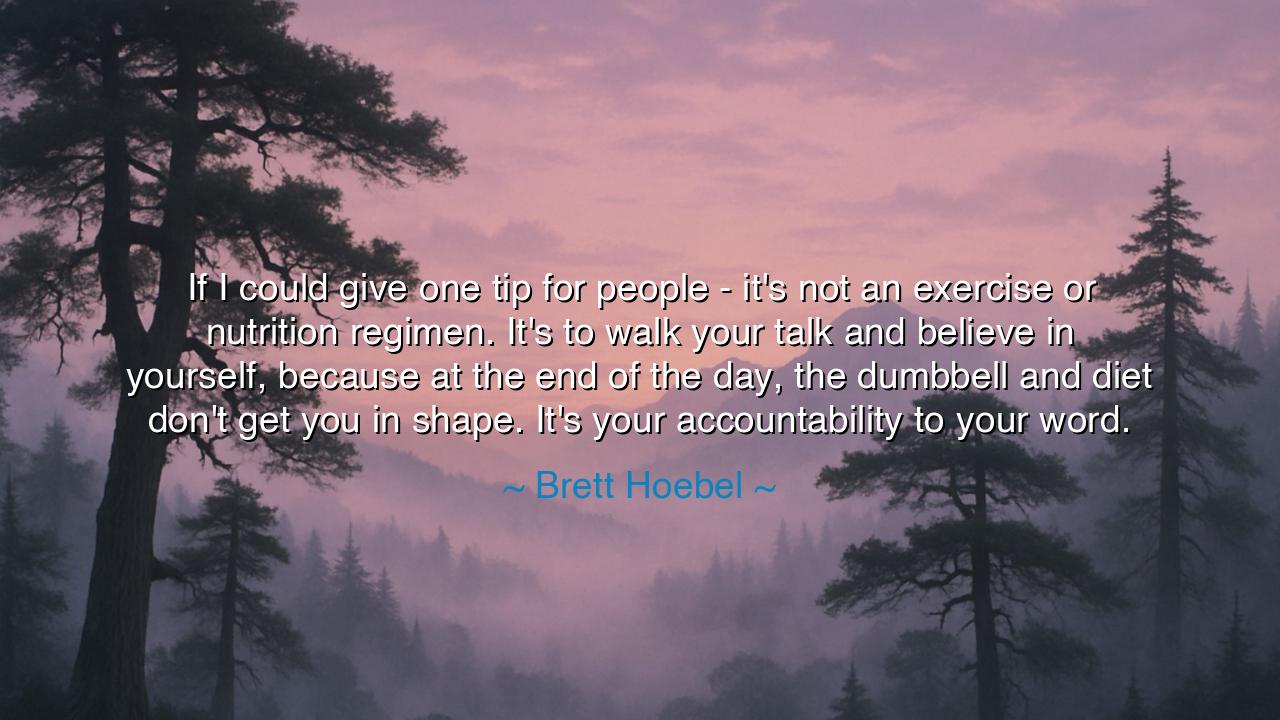
If I could give one tip for people - it's not an exercise or
If I could give one tip for people - it's not an exercise or nutrition regimen. It's to walk your talk and believe in yourself, because at the end of the day, the dumbbell and diet don't get you in shape. It's your accountability to your word.






When Brett Hoebel said, “If I could give one tip for people – it’s not an exercise or nutrition regimen. It’s to walk your talk and believe in yourself, because at the end of the day, the dumbbell and diet don’t get you in shape. It’s your accountability to your word,” he spoke with the voice of a modern philosopher clothed in the language of fitness. His words, though simple in sound, strike at the eternal heart of discipline—the truth that no tool, no plan, no diet can transform a person whose spirit remains uncommitted. For Hoebel, the battle for health, and indeed for greatness, begins not in the body but in the soul’s covenant with itself—a sacred agreement between one’s word and one’s will.
The ancients understood this law long before gyms and training regimens existed. In the schools of Socrates and Epictetus, students were taught that mastery over the body was only a reflection of mastery over the mind. They believed that the self must first be ruled before the world can be changed. So when Hoebel speaks of “accountability to your word,” he echoes those timeless voices. He is not merely giving advice on fitness; he is teaching a moral philosophy: that strength is not born from motion but from integrity, and that every promise broken to oneself weakens the foundation of the spirit.
The dumbbell and diet, in his teaching, are symbols. They represent the external forms—the tools of transformation—that so many cling to in search of change. But tools, however mighty, are lifeless without the will to use them. In ancient Sparta, warriors trained not merely for muscle or skill but for honor—the unyielding bond between their word and their action. A Spartan who swore to defend his comrades and failed was considered already dead, for he had betrayed his own essence. Likewise, Hoebel’s wisdom reminds us that to promise oneself transformation and to abandon that promise is to commit a quiet betrayal, one that corrodes both body and soul.
There is an old tale from the East, of a monk who vowed to lift a great stone every morning as a test of devotion. On the first day, he strained and sweated; on the second, he nearly quit. But his master said, “If you lift the stone only with your arms, you will never move it. Lift it also with your word, and it will obey.” The monk learned that the true weight was not the stone but the doubt within him. In time, the stone grew lighter—not because it changed, but because he had. So too, Hoebel’s teaching is not about exercise alone—it is about that same invisible strength: faith in one’s own word, the fire that makes every task possible.
When Hoebel says, “walk your talk and believe in yourself,” he is calling us back to that sacred simplicity. To “walk your talk” is to make every step an act of truth—to let your actions sing the same song your mouth proclaims. In an age where words are cheap and promises crumble like dust, this is a revolutionary act. For what greater power is there than the human being who does what they say, who stands as their own proof? Such a person, even before lifting a single weight, already radiates the strength that no training can manufacture—the strength of authenticity.
His teaching also speaks of belief, not as a hollow hope but as a weapon against hesitation. The ancients called this pistis—faith not in the unseen gods, but in the self’s divine potential. To believe in oneself is to plant the seed of transformation in the soil of conviction. Diets, routines, and regimens may shape the form, but it is belief that animates it with purpose. Without it, every resolution dies at dawn. With it, even the smallest effort becomes sacred labor, and every failure, a lesson on the path to mastery.
Thus, the lesson of Brett Hoebel’s words is timeless: your strength lies not in your tools but in your truthfulness. Do not chase perfection through programs or fads; chase alignment between who you are and what you claim to be. When your actions match your promises, when your mind and word are one, then no obstacle can stand before you. Whether in the gym, in your craft, or in the quiet work of becoming whole, remember this: it is not the dumbbell that transforms you—it is your devotion. And the one who keeps faith with their own word becomes, in time, a force as immovable and enduring as the mountains themselves.






AAdministratorAdministrator
Welcome, honored guests. Please leave a comment, we will respond soon